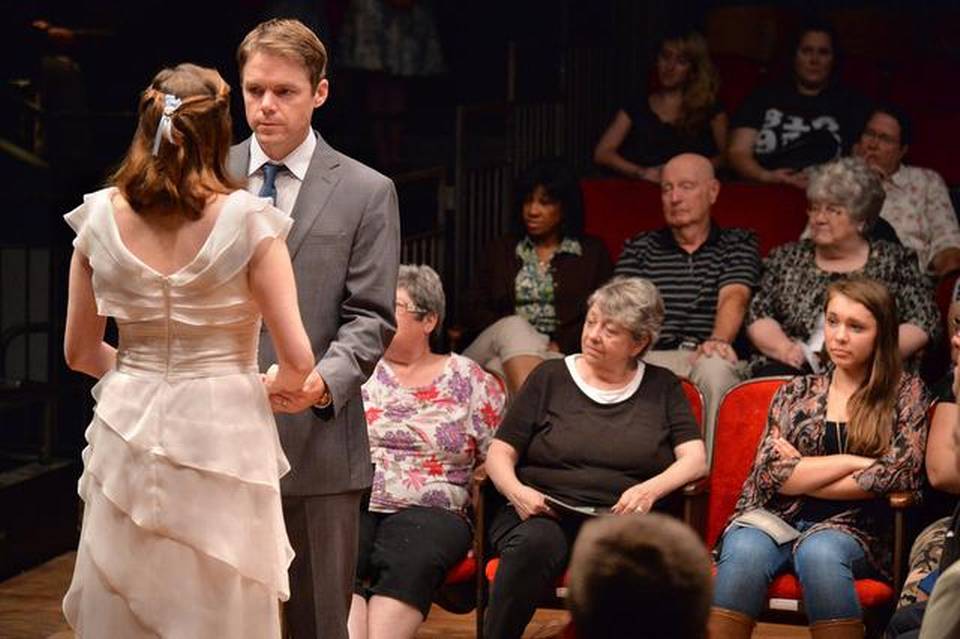Young ‘Town’
I was excited to see that a piece about Our Town was in this month’s American Theatre magazine (“Something Eternal,” March ’18), as I’ve just finished directing that play at a Catholic K-12 school in Kensington, Md., just outside D.C. I’ve had many jobs in my life, worn many hats, accomplished many things, but there is simply nothing of which I’m prouder than this production, in which these children dug deep into their souls to give the most moving portrayals I, and hundreds of others, have ever witnessed. And yet, according to Howard Sherman, that’s not really possible, because unless all these children have already lost loved ones, they simply can’t “fully appreciate and enact the agonizing third act” of Our Town.
I wonder if Mr. Sherman has actually witnessed a high school production of Our Town. I certainly wish he had attended mine. He would have found that children steeped in an environment of compassion and service, as these Catholic schoolkids are, possess a soulfulness that belies their youth. I’m guessing Wilder wanted precisely this youthful soulfulness when he chose to make the romantic leads of Our Town teenagers.
After the curtain call on the first night of the show, I found a woman waiting for me whom I did not know. She told me she lives in Kensington and has, over her lifetime, made a habit of seeing as many performances of Our Town as she possibly can, because it is her favorite play. Clasping my hands in hers, she told me that she knew every change I’d made to the script, that she loved all the changes, and that this performance had moved her like no other one she’d seen.
Perhaps we should, as a nation, spend more time pondering how much teenagers have to give, rather than how little. How capable they are of rising—or falling—to the level of our expectations. I expected great things of these kids, and greatness is what I got.
Marilyn Millstone
Kensington, Md.
Size Matters
As a fat actress I’ve grown a lot in how I perceive my own body, from fearing that it made me unworthy of pursuing this career at all to now believing that it is one of my assets as a performer (“All Sizes Fit All,” March ’18). When I played the Nurse in Romeo and Juliet a few years ago I remember loving the fact that I was fat, because for many reasons (not all of them good) fat is inherently funny. I loved the fact that Juliet was so much smaller than I was, that I had broad shoulders and a motherly bosom and all of those great things that assisted in making my relationship to this girl as her caretaker believable to watch. I didn’t resent the role at all—rather, I felt it helped guide me toward my “type” and taught me how to own and work with the physical tools I have.
Our bodies tell stories onstage before we ever say a word. And while I agree with the thesis of this piece that increasing the visibility of fatness onstage is a worthy and necessary pursuit, you cannot force an audience to see a fat woman onstage and not associate her with their own personal biases and stigmas. What you can do is guide them to see her through a new lens. An actress, simply by being fat, can add depth and nuance to a role where it didn’t previously exist because her fatness brings with it a host of social connotations that an audience must individually confront. Cast a fat actress as Blanche in Streetcar and watch how all of that text about being this delusional, fading Southern belle becomes endowed with complex new meaning. And that’s only one example—the possibilities are endless, but it requires directors to cast fat women not only for the sake of more visibility but as a deliberate artistic choice.
As fat actresses we can pout over never being considered for Juliet, or we can take the archaic theatrical paradigms we’re dissatisfied with and ditch them, focusing instead on the creation of new material that allows us to be seen and to tell our own authentic stories, or finding a tribe of theatremakers willing to re-purpose and explore established texts in unconventional ways. We do not need the permission of small-minded or cruel casting directors to perform as we are.
KD McTeigue
Albany, N.Y.


